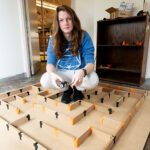
“BOYS CAN’T BE PRINCESSES”: An Understanding of Speech-Language Pathologists’ Perceptions of Gender Bias, LGBTQ+ Bias, and LGBTQ+ Related Issues When Working with Young Children

Name: Breanna L. Harrell
Major: Communication Sciences and Disorders
Minor: Education
Advisors: Donald M. Goldberg, Ph.D., and Ahmet Atay
With the growing understanding and awareness surrounding LGBTQ+ individuals and the biases that they may face when accessing services, such as speech and language intervention, this study investigated gender bias and LGBTQ+ bias that may be held by Speech-Language Pathologists (SLPs) which can impact clinical services provided to pediatric clients and their family members. Additionally, this study investigated if SLPs have familiarity with terminology about gender identity, correct pronoun usage, gender bias, and LGBTQ+ related issues in clinical language assessments and practices. As Evans et al. (2018) notes while there is documented bias against African American children in language assessment there is limited research into other biases held by SLPs and the impact that these biases can have on clients. To discover if SLPs expressed LGBTQ+ biases a Qualtrics survey was sent to ASHA certified SLPs asking them to identify key terms and their perspectives on LGBTQ+understanding and bias and the impact this has in providing clinical services. Two of the major findings of this study included that SLPs acknowledge there is gender bias in language assessment and materials, and SLPs were open to the fact that a child can identify as a prince or princess no matter their gender assigned at birth.
Key Words: cisgender, Lesbian, Gay, Bisexual, Transgender, Queer/Questioning, and Plus (LGBTQ+), gender non-conforming, gender identity, gender fluidity, non-binary, bias, gender bias, transgender bias, LGBTQ+bias, pronouns, language assessment, and Speech-Language Pathology.
 Loading...
Loading...
Breanna will be online to field comments on April 16:
2-4pm EDT (PST: 11am-1pm, Africa/Europe: evening)
Posted in I.S. Symposium 2021, Independent Study on April 10, 2021.
Related Posts
Related Areas of Study
Education
Graduate as a licensed teacher in pre-K-12 in fields ranging from science to music education
Major Minor Teaching LicensureCommunication Sciences & Disorders
Start the path toward a career in audiology or speech language pathology through coursework and clinical experiences.
Major Minor

